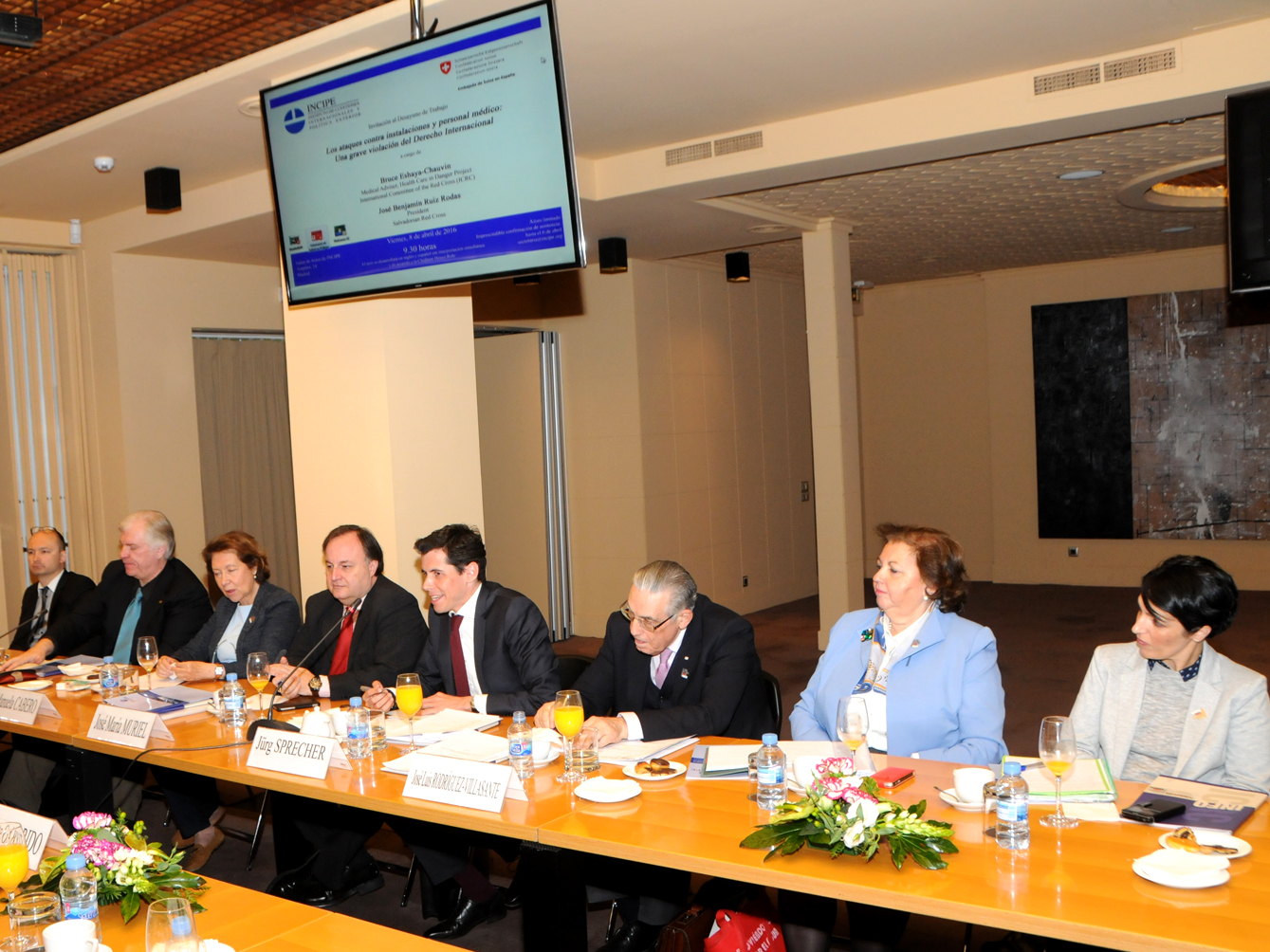Attacks Against Medical Institutions and Personnel: A Severe Violation of International Law

On April 8, 2016 INCIPE held a Working Breakfast, titled Attacks Against Medical Institutions and Personnel: A Severe Violation of International Law, to discuss the International Red Cross’s current initiatives to protect the rights of humanitarian aid workers, as well as to take an in-depth look at the specific situation of El Salvador. Keynote speakers were Mr. Bruce Eshaya-Chauvin, Medical Adviser of the International Committee of the Red Cross’s Health Care in Danger Project, and Mr. José Benjamín Ruíz Rodas, President of the Salvadorian Red Cross.
Since 1863, the International Committee of the Red Cross (ICRC) has worked to provide humanitarian aid to victims in areas of armed conflict across the globe. The ICRC’s essential humanitarian principles include humanity (promoting dignity and protecting the life and integrity of all acting humanely or receiving aid), impartiality (not discriminating against any patient for any reason when delivering humanitarian aid), and neutrality (not choosing a side or participating in any conflict). Additionally, especially due to the knock-on effect of health care, meaning that a problem for one medical provider consequently compromises health care for hundreds or even thousands of potential patients, the organization emphasizes the indispensability of the protection of health care worldwide.
In order to enforce the protection of health care workers and patients, the Geneva Conventions member states created the Health Care in Danger (HCiD) project at the 2011 ICRC Conference in Geneva, Switzerland. The project bases itself on improving the delivery and security of effective and impartial health care in armed conflict and other situations of violence. HCiD formed at a fitting time, as international health care needs are now higher than ever; from January 2012 to July 2014, the world suffered 2,375 attacks on medical institutions and personnel in over 20 areas of armed conflict or other emergencies, especially in the ongoing conflict in Syria.
While the ICRC does not have any new legal frameworks, it plans to improve the implementation of the existing laws in order to combat the continuing violence against all aspects of health care. These laws must address current threats, such as non-state armed groups that use this type of violence to increase their power, and national governments that do not protect health care personnel or victims in case they include “enemies”. The ICRC’s collaboration with other humanitarian aid organizations, such as Doctors Without Borders (MSF) and the World Health Organization (WHO), remains crucial in the path toward ensuring the security of medical care internationally.
With regard to El Salvador, the ICRC continues to have a visible presence there. The end of country’s devastating and seemingly endless civil war, which lasted from 1980 to 1992, introduced a new faction in Salvadorian society—the maras. These gangs, which originated outside of the country, are comprised mostly of formerly deported Salvadorians that brought new perspectives with them in their return to the country. They now claim 24-25 lives daily, while this number can reach as high as 53, and instill constant fear in the entire Salvadorian community.
So far, no government initiative, no matter how seemingly extreme, has reduced this violence. Conversely, The Salvadorian Red Cross has played an important role in improving the nation’s situation by, in addition to providing medical care, focusing on preventive measures. These include an educational system for parents, preventing specific illnesses such as the Zika virus, and instilling in children basic principles and values regarding not only health care but also arts and athletics. Recently, the Salvadorian Red Cross’s construction of a soccer stadium actually reduced the violence in the area it was built by offering a non-compromising pastime for local youths. Finally, by expanding its patient pool to include those with psychological and legal needs in addition to humanitarian needs, the Red Cross can provide comprehensive aid to citizens in the midst of constant insecurity.
Members of diverse fields attended the Working Breakfast, including ambassadors, embassy representatives, Red Cross members, and international relations experts. The event ended with a questionnaire where the attendees shared their views on different topics, especially about the relationship between humanitarian aid workers and the states in which they work, as well as about the effectiveness of international resolutions in protecting these workers.
Maria Peurach
INCIPE

